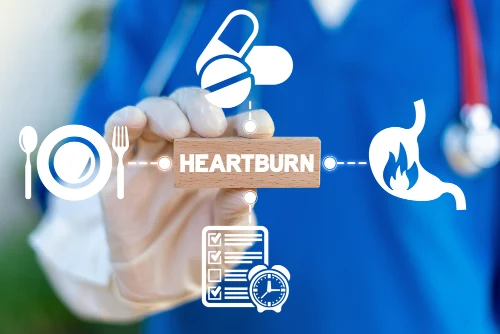Heartburn and acid reflux are common digestive issues that can significantly impact your quality of life. The discomfort and pain associated with these conditions can be managed through lifestyle and dietary changes. This blog explores the strategies you can employ to alleviate symptoms and improve your overall well-being.
Dietary Modifications
A. Avoid Trigger Foods: Certain foods can exacerbate heartburn and acid reflux. Stay away from spicy, acidic, and fatty foods. Coffee, citrus fruits, and tomatoes can be particularly problematic.
B. Smaller, Frequent Meals: Opt for smaller, more frequent meals to reduce the pressure on your lower esophageal sphincter, which can prevent stomach acid from flowing back into your esophagus.
C. Ditch Late-Night Snacking: Consuming food or heavy meals close to bedtime can worsen symptoms. Try to finish your last meal at least 2-3 hours before lying down.
D. Stay Hydrated with Water: Water can help dilute stomach acid, so drink it in between meals. Avoid carbonated beverages, as they can increase stomach pressure.
Lifestyle Adjustments
A. Elevate Your Upper Body: Raise the head of your bed by 6-8 inches or use extra pillows to keep your upper body elevated while sleeping. This helps prevent acid from flowing into the esophagus.
B. Maintain a Healthy Weight: Excess weight, especially around the abdomen, can put pressure on the stomach and lead to acid reflux. Aim to maintain a healthy weight through a balanced diet and regular exercise.
C. Avoid Tight Clothing: Tight belts and waistbands can increase abdominal pressure, making reflux more likely. Choose comfortable, loose-fitting clothing to reduce this risk.
Other Tips
A. Chew Gum: Chewing gum stimulates saliva production, which can help neutralize stomach acid.
B. Ginger and Herbal Teas: Some people find relief from heartburn with ginger or herbal teas like chamomile or licorice root.
C. Moderate Alcohol and Quit Smoking: Excessive alcohol consumption and smoking can relax the lower esophageal sphincter, making reflux more likely. Reducing or eliminating these habits can help.
D. Manage Stress: High stress levels can trigger or exacerbate heartburn and acid reflux. Practice relaxation techniques, such as deep breathing or meditation, to help manage stress.

